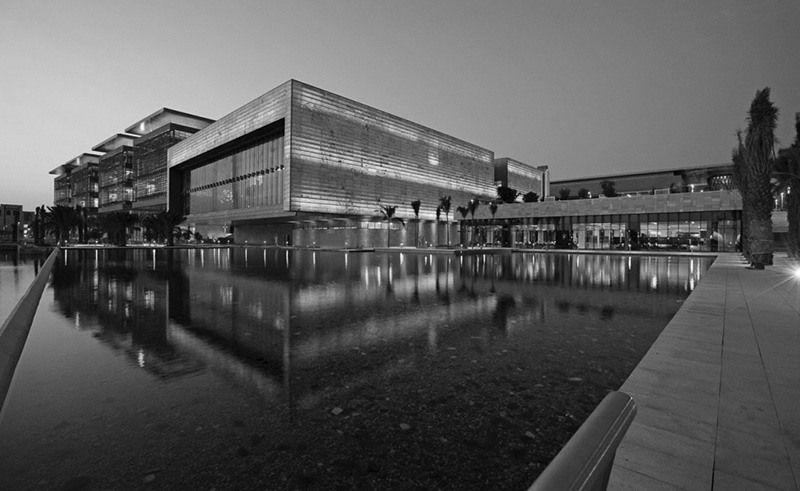Will Saudi Arabia Lead the Fourth Industrial Revolution?
The Kingdom has emerged as a key player in AI, investing billions in research and developing a vast digital infrastructure.

No one seems quite sure where AI will take us. Its proponents envision a tech utopia, creating efficiencies that liberate us from the drudgery of dull repetitive tasks to focus on what we most enjoy and love. Its detractors foresee a nightmare scenario in which passion and art become automated and the human touch is lost in the pursuit of mass production, all at a great environmental cost. What is clear, however, is that AI, much like the internet before it, will be the defining technology of the future, and that countries that stay ahead of it will dominate a new era that has been dubbed the Fourth Industrial Revolution.
While the world’s two economic superpowers, China and the US, battle for AI supremacy, Saudi Arabia has taken decisive steps over the past year to establish itself as a leading player in the era-defining technology. One such step was made in February 2024 with the Saudi Public Investment Fund's announcement of the world’s largest AI deep-tech fund, Alat, valued at USD 100 billion. In March, the Leap Conference saw global tech leaders gather in Riyadh, resulting in deals worth over USD 10 billion. The momentum continued in June when the Kingdom announced the launch of a National Semiconductor Hub, a key AI technology, aiming to drive industry localization by attracting 50 semiconductor design companies to the country and training 5,000 semiconductor engineers by 2030.

In its quest to create a dynamic, tech-driven, diversified economy through Vision 2030, AI - with its almost limitless scope of applications - can give Saudi companies an edge in ruthlessly competitive sectors like tourism and entertainment to say nothing of its vital role in making futuristic giga-projects like Neom a reality. It can also invigorate the stalwarts of the Saudi economy, with Aramco investing billions of dollars to develop its own AI power operating system, Nour OS, and Large Language Model (LLM), the Aramco metabrain. From identifying spills to auditing new oil wells, integrating AI has already allowed the world’s most profitable company to boost production, reduce costs and mitigate environmental damage.
"The Kingdom isn't just competing, it's aiming to lead,” Dr Alia Bahanshal, one of the Kingdom’s leading AI experts who served as Director of the National Centre for Data Analytics and AI at KACST, tells SceneNowSaudi. “When I first started, the field was nascent, but there was a palpable sense of potential and ambition. Over the years, I've seen that potential translate into concrete action. We now have a thriving ecosystem of AI startups, research institutions and government initiatives dedicated to advancing the field.”
While the Kingdom may not have the head start of the US or China, it possesses the two essential ingredients to build a strong AI industry in abundance: oil and financial capital. AI systems rely on a vast and staggeringly complex digital infrastructure, including power guzzling data centres and hyper-sophisticated semiconductor technology, whose billions of microscopic transistors are assembled through one of the most intricate supply chains in the world. Saudi Arabia’s focus on building this infrastructure, exemplified by the National Semiconductor Hub, is a strategic move geared to giving Saudi based AI companies a significant regional and international competitive advantage.

However, infrastructure is only part of the equation. Expertise is equally essential. Crucially, cutting-edge academic research has been the driving force behind modern technological innovation as exemplified by Silicon Valley’s rise in symbiosis with neighbouring Stanford University.
For Saudi Arabia, King Abdullah University of Science and Technology (KAUST) - a vast, sprawling international campus located off the coast of the Red Sea and home to the Middle East’s most advanced supercomputer, Shaheen 3 - is at the forefront of efforts to create a truly local AI ecosystem. Leading these efforts as President of KAUST’s AI Initiative is Jürgen Schmidhuber, a renowned German computer scientist famously dubbed the 'Godfather of AI' by Elon Musk.
“We want to contribute to a new Golden Age for science, analogous to the Islamic Golden Age that started over a millennium ago, when the Middle East was leading the world in science and technology,” Schmidhuber tells SceneNowSaudi. “Our KAUST students are being trained to become world class AI researchers. After graduation, they often join top international R&D and academic labs as well as top industries in the Kingdom like Aramco or establish their own AI startups in the Kingdom.”
Moving forward, the ultimate test for the Kingdom will be whether these vast state investments in digital infrastructure and academic research will, as in Silicon Valley and among the great Chinese tech giants, translate into a vibrant and innovative private sector. Dr. Alia, who now runs a company helping businesses in the Kingdom integrate AI into their operations, is optimistic.

“I believe we are only scratching the surface of what is possible. The solid foundation that has been laid through strategic investments, policy frameworks, and talent development initiatives positions the Kingdom for a significant leap forward. The focus now will shift from adopting existing AI solutions to developing homegrown technologies, spurring innovation and creating a vibrant startup ecosystem.”
While Saudi Arabia is still far from becoming the next Silicon Valley, there have already been notable successes. For instance, in March, Mozn - a Saudi AI startup ranked for two consecutive years among the world’s top fintech companies - partnered with Google Cloud to bring its software, FOCAL, to global clients. In June, Saudi AI company Intematix raised $20 million in the region’s largest pre-Series A funding round to date, signalling the Kingdom’s rapid rise as a new hub of AI innovation.
- Previous Article Iconic Ibiza Party CircoLoco is Coming to The Pyramids November 15th
- Next Article Travel Across History on Egypt's Most Iconic Bridges
Related Articles
Trending This Week
-
Nov 09,2024
SceneNow TV
Events Calendar

















